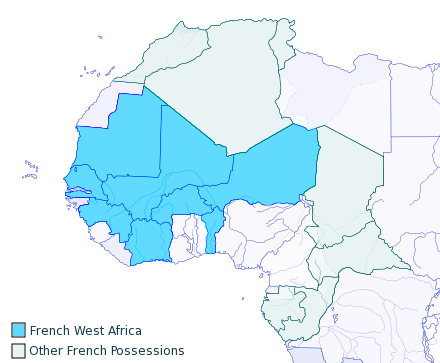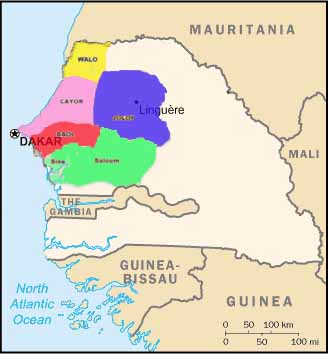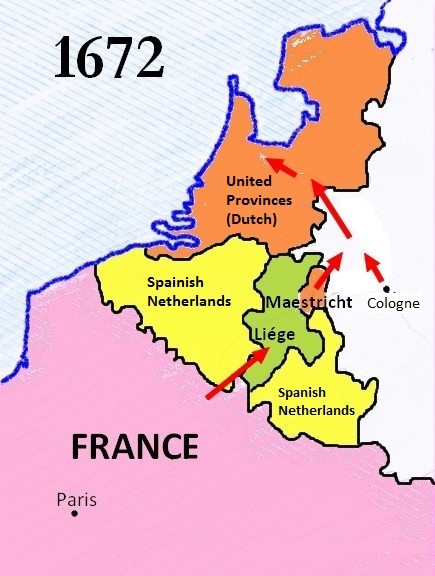|
French Conquest Of Senegal
The French conquest of Senegal started in 1659 with the establishment of Saint-Louis, Senegal, followed by the French capture of the island of Gorée from the Dutch in 1677, but would only become a full-scale campaign in the 19th century. First establishments According to some historians, French merchants from the Normandy cities of Dieppe and Rouen traded with the Gambia and Senegal coasts, and with the Ivory Coast and the Gold Coast, between 1364 and 1413. Probably, as a result, an ivory-carving industry developed in Dieppe after 1364.''African glory: the story of vanished Negro civilizations'' by John Coleman De Graft-Johnson p.12/ref> These travels, however, were soon forgotten with the advent of the Hundred Years War in France. Various European powers, such as Portugal, the Netherlands, and England then competed for trade in the area of Senegal from the 16th century onward. The island was captured by the Dutch in 1588, where they established defensive forts and devel ... [...More Info...] [...Related Items...] OR: [Wikipedia] [Google] [Baidu] |
Senegal
Senegal, officially the Republic of Senegal, is the westernmost country in West Africa, situated on the Atlantic Ocean coastline. It borders Mauritania to Mauritania–Senegal border, the north, Mali to Mali–Senegal border, the east, Guinea to Guinea–Senegal border, the southeast and Guinea-Bissau to Guinea-Bissau–Senegal border, the southwest. Senegal nearly surrounds The Gambia, a country occupying a narrow sliver of land along the banks of the Gambia River, which separates Senegal's southern region of Casamance from the rest of the country. It also shares a maritime border with Cape Verde. Senegal's capital is Dakar. Senegal is the westernmost country in the mainland of the Old World, or Afro-Eurasia. It owes its name to the Senegal River, which borders it to the east and north. The climate is typically Sahelian, though there is a wet season, rainy season. Senegal covers a land area of almost and has a population of around 18 million. The state is a Presidential system ... [...More Info...] [...Related Items...] OR: [Wikipedia] [Google] [Baidu] |
Hundred Years War
The Hundred Years' War (; 1337–1453) was a conflict between the kingdoms of England and France and a civil war in France during the Late Middle Ages. It emerged from feudal disputes over the Duchy of Aquitaine and was triggered by a claim to the French throne made by Edward III of England. The war grew into a broader military, economic, and political struggle involving factions from across Western Europe, fuelled by emerging nationalism on both sides. The periodisation of the war typically charts it as taking place over 116 years. However, it was an intermittent conflict which was frequently interrupted by external factors, such as the Black Death, and several years of truces. The Hundred Years' War was a significant conflict in the Middle Ages. During the war, five generations of kings from two rival dynasties fought for the throne of France, then the wealthiest and most populous kingdom in Western Europe. The war had a lasting effect on European history: both sides p ... [...More Info...] [...Related Items...] OR: [Wikipedia] [Google] [Baidu] |
Pulaar Language
Pulaar (in Latin: , in Ajami: ), often referred to as Pulaar du Nord, is dialect of the Fula language spoken primarily as a first language by the Fula and Toucouleur peoples in the Senegal River valley area traditionally known as Futa Tooro and further south and east. Pulaar speakers, known as '' Haalpulaar'en'' live in Senegal, Mauritania, the Gambia, and western Mali. The two main speakers of Pulaar are the Toucouleur people and the Fulɓe (also known as Fulani or Peul). Fula, considered as a single language, is the second most spoken local language in Senegal, being a first language for around 22% of the population. This correlates with 23.7% of the country in which Fulbe is the population's ethnicity. Pulaar is one of the national languages of Senegal alongside 13 others. It was admitted as an official language of Senegal by Presidential decree in 1971. There are around 28 known dialects of Fula, most of which are mutually intelligible with each other. The Fula dialects, a ... [...More Info...] [...Related Items...] OR: [Wikipedia] [Google] [Baidu] |
Martin A
Martin may refer to: Places Antarctica * Martin Peninsula, Marie Byrd Land * Port Martin, Adelie Land * Point Martin, South Orkney Islands Europe * Martin, Croatia, a village * Martin, Slovakia, a city * Martín del Río, Aragón, Spain * Martín River, a tributary of the Ebro river in Spain * Martin (Val Poschiavo), Switzerland England * Martin, Hampshire * Martin, Kent * Martin, East Lindsey, Lincolnshire, a hamlet and former parish * Martin, North Kesteven, Lincolnshire, a village and parish * Martin Hussingtree, Worcestershire * Martin Mere, a lake in Lancashire ** WWT Martin Mere, a wetland nature reserve that includes the lake and surrounding areas North America Canada * Rural Municipality of Martin No. 122, Saskatchewan, Canada * Martin Islands, Nunavut, Canada United States * Martin, Florida * Martin, Georgia * Martin, Indiana * Martin, Kentucky * Martin, Louisiana * Martin, Michigan * Martin, Nebraska * Martin, North Dakota * Martin, Ohio * Martin, Sout ... [...More Info...] [...Related Items...] OR: [Wikipedia] [Google] [Baidu] |
Sereer
The Serer people ('' Serer proper'': Seereer or Sereer) are a West African ethnoreligious groupGastellu, Jean-Marc, ''Petit traité de matrilinarité. L'accumulation dans deux sociétés rurales d'Afrique de l'Ouest'', Cahiers ORSTOM, série Sciences Humaines 4 (1985) nGastellu, Jean-Marc, ''Matrilineages, Economic Groups and Differentiation in West Africa: A Note'', O.R.S.T.O.M. Fonds Documentaire (1988), pp 1, 2–4 (pp 272–4), 7 (p 277/ref> Marguerite Dupire, Dupire, Marguerite, ''Sagesse sereer: Essais sur la pensée sereer ndut'', KARTHALA Editions (1994). For ''tim'' and ''den yaay'' (see p. 116). The book also deals in depth about the Serer matriclans and means of succession through the matrilineal line. See pp. 38, 95–99, 104, 119–20, 123, 160, 172–74,/ref> They fought against jihads in the 19th century, and subsequently opposed French colonial rule - resulting in Serer victory at the famous Battle of Djilass (13 May 1859), and the French Empire taking revenge a ... [...More Info...] [...Related Items...] OR: [Wikipedia] [Google] [Baidu] |
Wolof Empire
The Jolof Empire (), also known as Great Jolof or the Wolof Empire, was a Wolof state in modern-day Senegal, that ruled portions of Mauritania and Gambia from the mid-14th centuryFage, J. D.; Oliver, Roland; "The Cambridge History of Africa." Volume 3. Cambridge University Press, 1975, p. 486, (or possibly earlier) until 1549. Following the battle of Danki, its vassal states were fully or ''de facto'' independent; in this period it is known as the Jolof Kingdom. Origins The region that became Jolof was initially inhabited by the Soce and then Serer peoples, who were driven south by the Wolof by the 13th century. Wolof oral traditions relate that was named after a local chief Jolof Mbengue. The empire consisted mostly of Wolof, Serer and Fula from north of the Senegal River. Before the empire's rise, the region was ruled by Lamanes of the Mbengue, Diaw and Ngom families. They were related to early rulers of neighboring kingdoms such as Baol. Jolof was a vassal of the Mali Emp ... [...More Info...] [...Related Items...] OR: [Wikipedia] [Google] [Baidu] |
American Revolutionary War
The American Revolutionary War (April 19, 1775 – September 3, 1783), also known as the Revolutionary War or American War of Independence, was the armed conflict that comprised the final eight years of the broader American Revolution, in which American Patriot (American Revolution), Patriot forces organized as the Continental Army and commanded by George Washington defeated the British Army during the American Revolutionary War, British Army. The conflict was fought in North America, the Caribbean, and the Atlantic Ocean. The war's outcome seemed uncertain for most of the war. However, Washington and the Continental Army's decisive victory in the Siege of Yorktown in 1781 led King George III and the Kingdom of Great Britain to negotiate an end to the war in the Treaty of Paris (1783), Treaty of Paris two years later, in 1783, in which the British monarchy acknowledged the independence of the Thirteen Colonies, leading to the establishment of the United States as an independent and ... [...More Info...] [...Related Items...] OR: [Wikipedia] [Google] [Baidu] |
France In The Seven Years War
France was one of the leading participants in the Seven Years' War, which in fact lasted nine years between 1754 and 1763. France entered the war with the hope of achieving a lasting victory against Prussia, Britain, and their German allies and with the hope of expanding its colonial possessions. While the first few years of war proved successful for the French, in 1759 the situation reversed and they suffered defeats on several continents. In an effort to reverse their losses, France finished an alliance with their neighbor, Spain, in 1761. In spite of this the French continued to suffer defeats throughout 1762 eventually forcing them to sue for peace. The 1763 Treaty of Paris confirmed the loss of French possessions in North America and Asia to the British. France also finished the war with very heavy debts, which they struggled to repay for the remainder of the 18th century which later led to the French Revolution in 1789 and the Haitian Revolution in 1791. Background The p ... [...More Info...] [...Related Items...] OR: [Wikipedia] [Google] [Baidu] |
Capture Of Senegal
The British capture of Senegal took place in 1758 during the Seven Years' War with France, as part of a concerted British strategy to weaken the French economy by damaging her international trade. To this end, a succession of small British military expeditions landed in Senegal and captured Gorée and Fort Saint Louis, the French slave fort located at Saint-Louis, seizing French vessels and supplies. By late 1758 the whole of the French colony on the Senegalese coast had been captured by the British, with administrative matters being handled by the first (and only) British Governor of Senegal, Lieutenant Colonel Richard Worge. Background The plan was devised by an American merchant Thomas Cumming who had previously visited West Africa, and extensively considered the possibilities for a British expedition. The plan was built around Britain's growing dominance on the Oceans which had dramatically reduced French sea power. A British naval force under Captain Henry Marsh wo ... [...More Info...] [...Related Items...] OR: [Wikipedia] [Google] [Baidu] |
Franco-Dutch War
The Franco-Dutch War, 1672 to 1678, was primarily fought by Kingdom of France, France and the Dutch Republic, with both sides backed at different times by a variety of allies. Related conflicts include the 1672 to 1674 Third Anglo-Dutch War and 1675 to 1679 Scanian War. In May 1672, France nearly overran the Netherlands, an event remembered in Dutch history as the ''Rampjaar'', or "Disaster Year". However, by late July the position had stabilised, while concern over French gains brought the Dutch support from Leopold I, Holy Roman Emperor, Emperor Leopold I, Habsburg Spain, Spain and Brandenburg-Prussia. Previously an ally of France, Kingdom of England, England Treaty of Westminster (1674), exited the war in February 1674. Now facing a war of attrition on several fronts, Louis XIV of France instead focused on strengthening French borders with the Spanish Netherlands and Rhineland, while a coalition led by William III of England, William of Orange sought to minimise any losses. ... [...More Info...] [...Related Items...] OR: [Wikipedia] [Google] [Baidu] |
Jean II D'Estrées
Jean may refer to: People * Jean (female given name) * Jean (male given name) * Jean (surname) Fictional characters * Jean Grey, a Marvel Comics character * Jean Valjean, fictional character in novel ''Les Misérables'' and its adaptations * Jean Pierre Polnareff, a fictional character from ''JoJo's Bizarre Adventure'' * Jean Luc Picard, fictional character from ''Star Trek Next Generation'' Places * Jean, Nevada, United States; a town * Jean, Oregon, United States Entertainment * Jean (dog), a female collie in silent films * "Jean" (song) (1969), by Rod McKuen, also recorded by Oliver * ''Jean Seberg'' (musical), a 1983 musical by Marvin Hamlisch Other uses * JEAN (programming language) * USS ''Jean'' (ID-1308), American cargo ship c. 1918 * Sternwheeler Jean, a 1938 paddleboat of the Willamette River See also *Jehan * * Gene (other) * Jeanne (other) * Jehanne (other) * Jeans (other) * John (other) John is a common ... [...More Info...] [...Related Items...] OR: [Wikipedia] [Google] [Baidu] |
Early Modern France
The Kingdom of France in the early modern period, from the French Renaissance, Renaissance () to the French Revolution, Revolution (1789–1804), was a monarchy ruled by the House of Bourbon (a Capetian dynasty, Capetian cadet branch). This corresponds to the so-called ''Ancien Régime'' ("old rule"). The territory of France during this period territorial evolution of France, increased until it included essentially the extent of the France, modern country, and it also included the territories of the French colonization of the Americas, first French colonial empire overseas. The period is dominated by the figure of the "Sun King", Louis XIV (his reign of 1643–1715 being one of the List of longest-reigning monarchs, longest in history), who managed to eliminate the remnants of medieval France, medieval feudalism and established a centralized government, centralized state under an absolute monarchy, absolute monarch, a system that would endure until the French Revolution and First ... [...More Info...] [...Related Items...] OR: [Wikipedia] [Google] [Baidu] |





